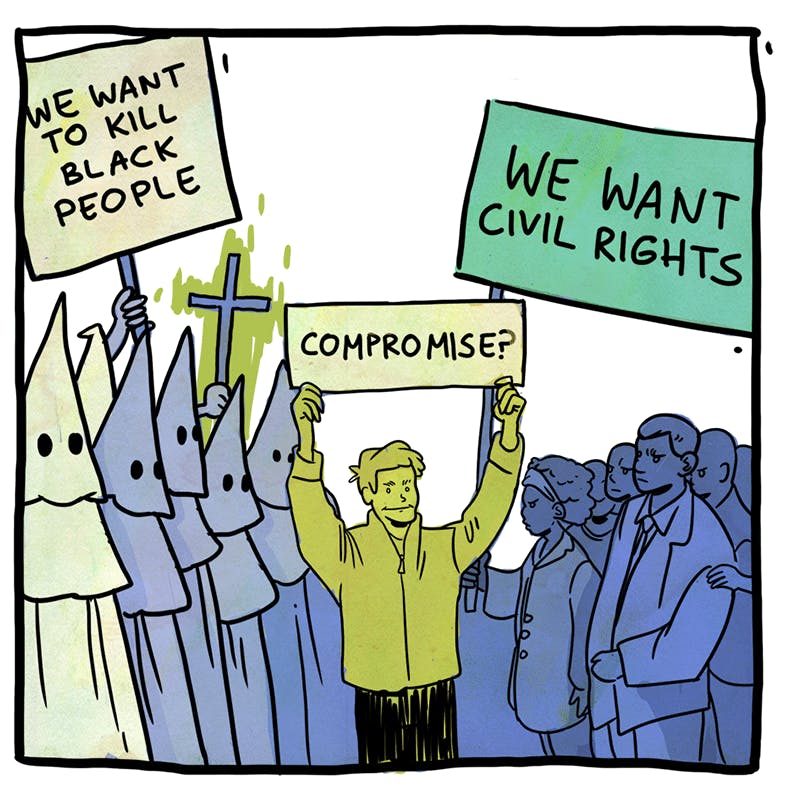To a degree, the attempt to assign to the "near abroad" the highest priority in Russian geopolitical thinking was justified in the sense that some measure of order and accommodation between postimperial Russia and the newly independent states was an absolute necessity, in terms of security and economics. However, what gave much of the discussion a surrealistic touch was the lingering notion that in some fashion, whether it came about either voluntarily (because of economics) or as a consequence of Russia's eventual recovery of its lost power?not to speak of Russia's special Eurasian or Slavic mission?the political "integration" of the former empire was both desirable and feasible. In this regard, the frequently invoked comparison with the EU
neglects a crucial distinction: the EU, even allowing for Germany's special influence, is not dominated by a single power that alone overshadows all the other members combined, in relative GNP, population, or territory. Nor is the EU the successor to a national
empire, with the liberated members deeply suspicious that "integration" is a code word for renewed subordination. Even so, one can easily imagine what the reaction of the European states would have been if Germany had declared formally that its goal was to
consolidate and expand its leading role in the EU along the lines of Russia's pronouncement of September 1995 cited earlier.
The analogy with the EU suffers from yet another deficiency. The open and relatively developed Western European economies were ready for democratic integration, and the majority of Western Europeans perceived tangible economic and political benefits in
such integration. The poorer West European countries were also able to benefit from substantial subsidies. In contrast, the newly independent states viewed Russia as politically unstable, as still entertaining domineering ambitions, and, economically, as an obstacle to their participation in the global economy and to their access to much-needed foreign investment. Opposition to Moscow's notions of "integration" was particularly strong in Ukraine. Its leaders quickly recognized that such "integration," especially in light of Russian reservations regarding the legitimacy of Ukrainian independence, would eventually lead to the loss of national sovereignty. Moreover, the heavy-handed Russian treatment of the new Ukrainian state?its unwillingness to grant recognition of Ukraine's borders, its questioning of Ukraine's right to Crimea, its insistence on exclusive extraterritorial control over the port of Sevastopol?gave the aroused Ukrainian national-ism a distinctively anti-Russian edge. The self-definition of Ukrainian nationhood, during the critical formative stage in the history of the new state, was thus diverted from its traditional anti-Polish or anti-Romanian orientation and became focused instead on opposition to any Russian proposals for a more integrated CIS, for a special Slavic community (with Russia and Belarus), or for a Eurasian Union, deciphering them as Russian imperial tactics.
Ukraine's determination to preserve its independence was encouraged by external support. Although initially the West, especially the United States, had been tardy in recognizing the geopolitical importance of a separate Ukrainian state, by the mid1990s both America and Germany had become strong backers of Kiev's separate identity. In July 1996, the U.S. secretary of defense declared, "I cannot overestimate the importance of Ukraine as an independent country to the security and stability of all of Europe,"
while in September, the German chancellor?notwithstanding his strong support for President Yeltsin?went even further in declaring that "Ukraine's firm place in Europe can no longer be challenged by anyone ... No one will be able any more to dispute
Ukraine's independence and territorial integrity." American policy makers also came to describe the American-Ukrainian relationship as "a strategic partnership," deliberately invoking the same phrase used to describe the American-Russian relationship.
Without Ukraine, as already noted, an imperial restoration based either on the CIS or on Eurasianism was not a viable option. An empire without Ukraine would eventually mean a Russia that would become more "Asianized" and more remote from Europe.
Moreover, Eurasianism was also not especially appealing to the newly independent Central Asians, few of whom were eager for a new union with Moscow.
Uzbekistan became particularly assertive in supporting Ukraine's objections to any elevation of the CIS into a supranational entity and in opposing the Russian initiatives designed to enhance the CIS. Other CIS states, also wary of Moscow's intentions, tended to
cluster around Ukraine and Uzbekistan in opposing or evading Moscow's pressures for closer political and military integration. Moreover, a sense of national consciousness was deepening in almost alt of the new states, a consciousness increasingly focused
on repudiating past submission to Moscow as colonialism and on eradicating its various legacies. Thus, even the ethnically vulnerable Kazakstan joined the other Central Asian states in abandoning the Cyrillic alphabet and replacing it with the Latin script as
adapted earlier by Turkey. In effect, by the mid-1990s a bloc, quietly led by Ukraine and comprising Uzbekistan, Turkmenistan, Azerbaijan, and sometimes also Kazakstan, Georgia, and Moldova, had informally emerged to obstruct Russian efforts to use the CIS
as the tool for political integration.




 Reply With Quote
Reply With Quote












 Residing:
Residing: 
 and
and 











 <-
<- 

 GOGOGO WINLAND
GOGOGO WINLAND  WINLAND
WINLAND 


Bookmarks